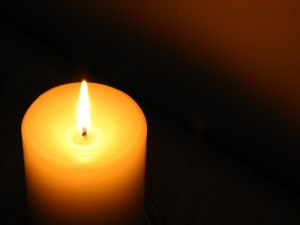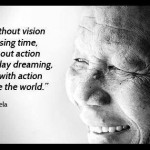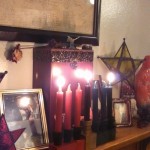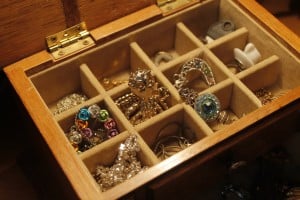Honoring Troublesome Ancestors
Post by Cecily Joy Williams, M.Div.
Last year, when I learned of my father’s passing, I went into spirals of confusion and shock. Due to complex family issues, I was not able to go to the funeral and have my last goodbyes. Without any closure, it was obvious what I had to do when Samhain came around a few months later. I was not in the mood for the happy Wiccan Halloween costumes and fall celebrations. I used Samhain as a time to mourn. I dedicated my whole ritual to saying goodbyes. I did a mini funeral with burying symbolism and decorated the altar with things he loved. The decorations even included his downfall, a bottle of beer. I did not do this mourning ritual truly for him. He was not the best Dad and maybe he did not deserve a great goodbye. I did it because I deserved to be able to say goodbye regardless of our estranged relationship. I deserved some peace.
Peace, of course, when you are in that grieving cycle is hard to come by if not somewhat impossible. Once the shock left me, I spent the next year circling anger. I was enraged on Father’s Day and every day that reminded me of fatherly love. I was mad that his family left me out of the mourning process. But I was madder at my father for leaving me fatherless. In my mind, it was his fault for never really taking care of himself. It was his fault for being a careless, semi-dead-beat father. It was his fault that I would never get that happy-ending you see on TV when the bad father reforms. I will never have that unconditional supportive fatherly love. He died without resolving anything; just left a void, and it was unfair.
As you can read, I am still mad. When Samhain came around again, I was still in the state of thinking how to honor my family and ancestors. A year ago, what I needed to do was so clear but now I am left to wonder how to include my father in celebrations when I am still so angry at him. How do we honor the troublesome ancestors? The ones that abandoned us, betrayed us, lied to us, or we just did not like when they were alive. Do we leave them out of our ancestor and family worship rituals? In many spirit based traditions, not honoring our ancestors can serve to be detrimental. We are asking for trouble by not honoring all aspects of our life, history and experiences. By denying the energies around us, we run the risk of inviting tricks from spirits determined to get our attention. So, how do we keep the communication to the other side open when supposed loved ones cause us conflicted emotions?
While some of the more abusive deceased family maybe too triggering to work, I think there are a lot of benefits to working with the less painful spirits. In both African and European Pagan traditions like Voodoo and European, there are difficult and tricky spirits that we venerated. We have our trickster Gods such as Pan or as in Voodoo any spirit can be a savior or a vengeful deity. When working with Papa legba, I have to watch out for his lovely jokes and much like my father he enjoys the gift of a good drink. In many Pagan traditions, spirits and Gods are not perfect or angelic. They came with both their wisdom and their downsides. Either way, we can learn something from all types of beings. We learn from ancestor and spirit communication that human experience and personalities are multi-faceted. We learn that the universe has its blessings and obstacles. We learn that life is not simply good or bad but a mix of gray. We learn that the people we love (God or human) can both hurt and heal us. We learn to be careful with our trust but open to lessons of elders and spiritual guides.
Besides, learning to walk in gray areas, working with complex ancestors can be a healing journey. After all, we cannot learn to move forward in our lives without facing our past. In some cases, like mine, that means facing past daddy issues. It means, accepting where and who I come from. It means accepting what I lost and the relationship I may never have.
This time, when Samhain came around, I added symbols of my father alongside my spiritual ancestors such as Yemaya and Papa Legba, combining my mundane relationship experiences with my higher spiritual ones. Instead of a grieving ritual, I am looking to find ways of incorporating my father into my regular spiritual observances. I am looking to have a regular conversation with my father, something I was not able to do while he was living. In my current and future rituals hope to end the denial, and start our new relationship with bold honesty. Perhaps, this means yelling, crying and asking all the unanswered questions. Whatever these rituals look like, it will be raw and real. After all, there is no greater benefit to working with those troublesome spirits than learning who you really were, are, and will become by facing your wounds and fears and coming up on the other side.
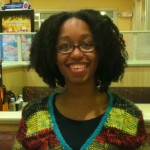 Cecily is an Eclectic Solitary Wiccan of 10 years, currently living in Boulder, CO. After completing her Master of Divinity degree from Naropa University, she went on to work at the local homeless and domestic violence shelters. She is passionate about African Diasporic spirituality, Spirit Guide communication and Tarot, as well as victim advocacy using an interfaith approach.
Cecily is an Eclectic Solitary Wiccan of 10 years, currently living in Boulder, CO. After completing her Master of Divinity degree from Naropa University, she went on to work at the local homeless and domestic violence shelters. She is passionate about African Diasporic spirituality, Spirit Guide communication and Tarot, as well as victim advocacy using an interfaith approach.

